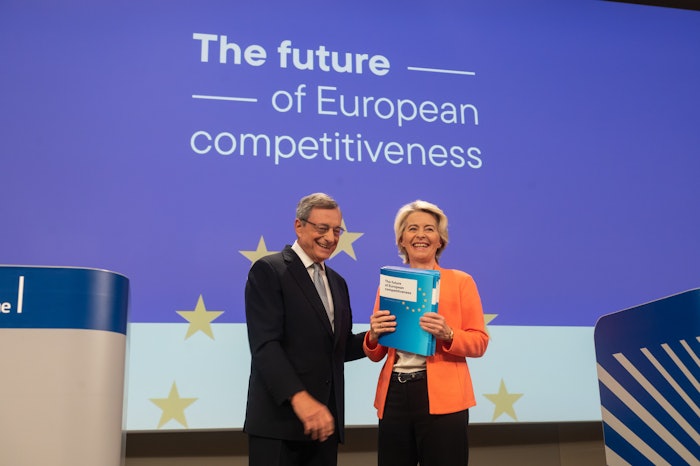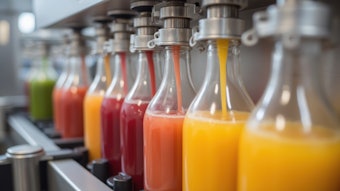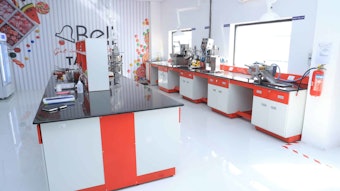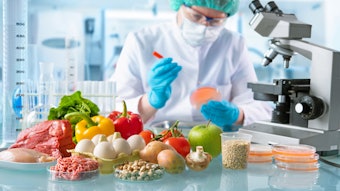
In June 2024, more than 400 million voters from the 27 European Union Member States were called to vote in the European elections. Every five years, not only is a new European Parliament elected, but the result of this election also determines the direction of the European Commission, the executive body of the EU.
While the resultsa were marked by a noticeable increase in representation from right-wing and far-right parties, the traditional political groups, popular (EPP), socialist (S&D) and liberals (Renew), maintained the majority of the seats, and are expected to play a crucial role in shaping future EU legislation. This majority was key in the re-election of Ursula von der Leyen as President of the European Commission.
Following her re-election, President von der Leyen has presented her proposed college of commissionersb that now has to be approved by the European Parliament. The repartition of the portfolios, vice presidencies and mission letters to these Commissioners is an indication of the political guidelines that the UE is going to follow in the next five years.
The next Commission’s work will also draw on political reports published this year, in particular, two of them can be very relevant for the flavour and for the food industries: The Draghi reportc, commissioned by Von der Leyen to former European Central Bank President to look for a way forward for EU’s competitiveness and the Strategic Dialogue on the Future of EU Agricultured, with the farmer’s protest in several European capitals (including Brussels) having a big impact.
Footnotes
ahttps://www.results.elections.europa.eu/en/
bhttps://commission.europa.eu/about-european-commission/towards-new-commission-2024-2029/commissioners-designate-2024-2029_en
chttps://commission.europa.eu/topics/strengthening-european-competitiveness/eu-competitiveness-looking-ahead_en
dhttps://commission.europa.eu/strategy-and-policy/priorities-2019-2024/european-green-deal/agriculture-and-green-deal/strategic-dialogue-future-eu-agriculture_en
A Shift in Priorities
All this marks a turning point in EU politics. From what we can see so far, compared to the previous political term 2019 – 2024, there is a shift in the EU political priorities, and what is more important, one that resonates with the flavour industry priorities in four key areas:
1. A stronger emphasis on competitiveness, with dedicated support for SMEs:
The so-called ‘Draghi’s report’: The future of European competitiveness – A competitiveness strategy for Europe was referred to in all of the Commissioner’s mission letters, and its findings will contribute to the Commission’s work on a new plan for Europe’s sustainable prosperity and competitiveness. The main focus of this report is how to improve Europe’s competitiveness, and a focus is set on the regulatory and administrative burdens that many European companies face, which are especially challenging for SMEs. EFFA, through its 12 National Associations, represents over 300 SMEs in Europe, which are deeply impacted by any European legislative change.
2. A greater focus on agriculture and farmers' needs, also in relation to food security:
The nomination of Christophe Hansen as Commissioner for Agriculture & Food and Olivér Várhelyi as Commissioner for Health & Animal Welfare marks a significant shift in the EU’s approach to these sectors. The two designated Commissioners still have to undergo the European Parliament hearings, but what’s interesting is that previously, the health and food portfolios were combined, while now food is coupled with agriculture. In their mission letters there is no mention to the ‘Farm to Fork Strategy’, which was the previous Commission main focus when it came to the food sector and the EU Green Deal, and instead we can find several references to the Strategic Dialogue on Sustainable Agriculture, with a key mention to ‘food sovereignty’ and again, dedicated attention to SME’s through a newly created ‘SME and competitiveness check’.
3. Ongoing efforts to make healthy choices more accessible and easier for consumers
The Strategic Dialogue on the future of EU agriculture, gave great attention to making “the healthy and sustainable choice, the easy one” as well as “helping consumers to embrace the transition towards plant-based products” and “to create enabling food environments where balanced, sustainable healthy diets are available, accessible, affordable, and attractive”. The flavour industry can play a crucial role in achieving these objectives by enabling the food and drink industry to make health-conscious and sustainable products that also taste great. The flavour industry is committed to helping consumers embrace healthier lifestyles without sacrificing taste.
4. The introduction of an industrial strategy to complement the Green Deal, while maintaining a focus on decarbonisation.
The Commission refers now to a new “Clean Industrial Deal”, which will also be based on Draghi’s report. We are witnessing a move from an exclusive focus on the ‘Green Deal’ to a broader approach that can integrate an ‘Industrial Deal’ alongside it. This was the main call of the Antwerp Declaration, of which EFFA is signatory, together with more than 1000 organisations.
Strengthening Partnerships for Long-Term Success: EFFA’s Strategic Vision
In the past few months, and as a key strategy for the coming years, EFFA has been strengthening its networks, joining different coalitions, having meetings with the European Parliament and European Commission, and strengthening the National Associations network, in order to be part of this shift and put forward to the EU institutions how the flavour industry can be an ally in achieving the EU objectives. Having held four key meetings with recently elected members of the European Parliament, the discussions have reaffirmed shared priorities between the flavour industry and EU policymakers.
As we look ahead to the 2024–2029 legislative term, the alignment between EFFA’s objectives and the EU’s strategic priorities could not be more evident. Healthy and sustainable food choices, food innovation, and food security are just a few of the areas where the flavour industry, in partnership with its stakeholders, has a vital role to play. To fully realize this potential, it is crucial that we remain committed to a long-term vision—one that is rooted in partnership.
A key priority is to ensure that EFFA’s core messages are fully aligned with the EU’s strategic goals. This alignment is essential to maintaining the association’s influence and success in policy discussions, particularly as the European Commission and Parliament advance their legislative agendas for the 2024–2029 term.
By aligning its advocacy with EU priorities, EFFA aims to solidify the flavour industry's role as a key ally for EU policymakers and contribute to the industry’s long-term sustainability.
Brussels, October 4, 2024
Jimena Gómez de la Flor, EFFA Communications and Public Affairs Director
Since September 1st 2024, Jimena Gomez de la Flor has been serving as the Communications & Public Affairs Director of the European Flavour Association (EFFA). Jimena joined EFFA in 2015 as the Communications Director. Her new role is a key part of the EFFA strategic vision to strengthen the EFFA advocacy and Public Affairs pillar while increasing the visibility of both the flavour industry and the association in Europe.










